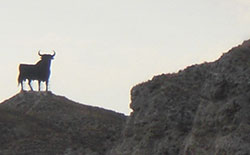Do You Know The Origin Of The Spanish Bull?

Did you know that the bull you can see everywhere along Spanish roads is originally from an advertisement made by Osborne, a Spanish food and drink brand?
Osborne started producing sherry in 1772 in Southern Spain. It gradually introduced other products to its protfolio such as Rioja wine, Port, brandy, spirits or energy drinks, and Iberian ham.

In 1956, Manolo Prieto designed the bull shape to advertise Veterano, the main Osborne brandy at the time. The bull was then displayed on huge advertising boards across Spain. Until the Spanish government approved a law against road advertisements in 1988, these boards showed slogans. These were removed but the bull stayed and soon became the emblem of Spain. In 1994, the government tried to remove it but it had to step back as people were fighting to keep it. Andalusia even called it a “cultural monument”. It was decided in 1997 to keep it as it had become part of the Spanish heritage. Today, the bull represents the Spanish identity in Spain and also across the rest of the world. It is such a deep symbol that some Catalan separatists destroyed it several times. Hence, there are almost no bulls left in Catalonia, where people prefer to use the donkey as their emblem.
The bull is now used by the country as a marketing tool, and it is working very well! It is sold by every tourist souvenir shop in Spain (except in Catalonia where it is replaced by the donkey). An excellent marketing lesson from Osborne!